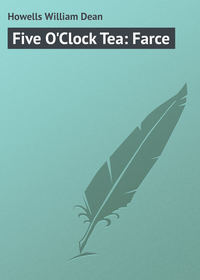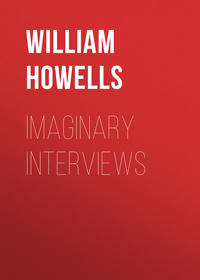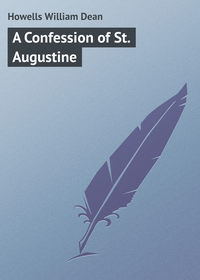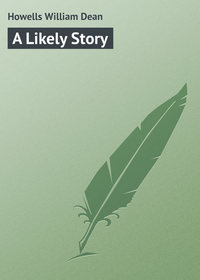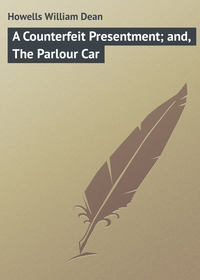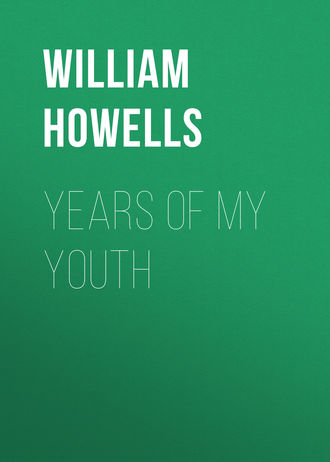 полная версия
полная версияYears of My Youth
He had a grotesque humor which vented itself in jokes at the expense of my mother’s implicit faith in everything he said, as when she wondered how the cow got into the garden, and he explained, “She pulled out the peg with her teeth and put it under her fore leg and just walked through the gate,” and my mother answered, “Well, indeed, indeed, I believe she did, child.” She had little humor of her own, but she had a childlike happiness in the humor of us others, though she would not suffer joking from any but him. She relied upon him in everything, but in some things she drew a sharp line between the duties of her boys and girls in the tradition of her Pennsylvania origin. Indoor work was for girls, and outdoor for boys, and we shared her slight for the Yankee men who went by our gate to the pasture with their milk-pails. That was woman’s work though it was outdoor work; and though it was outdoor work to kill chickens for the table, none of us boys had the heart to cut their heads off because we could not bear to witness their post-mortem struggles; but my brother brought out his gun and shot them, and this pursuit of them as game in our barnyard got us over a difficulty otherwise insuperable. The solution of our scruple, which my father shared, must have amused him; but my brother took it seriously. His type of humor was in the praise which long afterward he gave a certain passage of my realistic fiction, when he said it was as natural as the toothache.
Throughout that earlier time my father’s chief concern was first that very practical affair of making his paper pay for the office and the house, and then incidentally preventing the spread of slavery into the territories. He was willing enough, I fancy, to yield his silent partnership in my studies to the young printer who now, for no reason that I can remember, began to take an active share in them. I have told in My Literary Passions how J. W. and I read Cervantes and Shakespeare together; but I could not say just why or when we began to be boon companions in our self-conducted inquiries into Latin and Greek, and then into German, which presently replaced Spanish in my affections through the witchery of Heine. He had the definite purpose of making those languages help him to a professorship in a Western college, but if I had any clear purpose it was to possess myself of their literature. To know them except to read them I do not think I cared; I did not try to speak or write the modern tongues; to this day I could not frame a proper letter in Spanish, German, French, or Italian, but I have a literary sense of them all. I wished to taste the fruit of my study before I had climbed the tree where it grew, and in a manner I did begin to gather the fruit without the interposition of the tree. Without clear knowledge of their grammatical forms, I imitated their literary forms. I cast my poetry, such as it was, into the metres of the Spanish poets I was reading, and without instruction or direction I acquainted myself with much of their literary history. I once even knew from the archaic tragedy of her name who Iñez de Castro was; I do not know now.
My friendship with J. W. early became chief of the many friends of a life rich in friendships. He was like most of his craft in his eccentric comings and goings to and from our employ, when sometimes we had no work to give him, and sometimes he had none to give us. When he left us he always went to Wisconsin, where he had once lived; and when he came back from one of these absences he would bring with him bits of character which he gave for our joy in his quaint observance, such as that of the mother who complained of her daughter because “she didn’t cultivate her featur’s none; she just let ’em hing and wallop,” or the school-mistress who genteelly explained in the blackberry-patch where he found her, that she was “just out picking a few berries for tea-he-he-he,” or the country bachelor who belatedly made up his mind to marry, and in his default of female acquaintance took his place on the top rail of a roadside fence, and called to the first woman who passed, “Say! You a married woman?” and then at the frightened answer, indignantly gasped out, “Yes, sir!” offered a mere “Oh!” for all apology and explanation, and let himself vanish by falling into the corn-field behind him.
J. W. literally made his home with us, for as if the burden of work for our own large family were not enough for my mother, we had always some of the printers, men or maids, to board. He entered into the spirit of our life; but it was recognized that he was peculiarly my friend, and we were left to our special comradeship. In that village nearly everybody played or sang, and in the summer nights the young people went about serenading one another’s houses, under the moon which was then always full; and J. W. shared in every serenade where a tenor voice was welcome. At the printing-office, in the afternoon when the compositors were distributing their cases, he led the apprentice-girls in the songs which once filled the whole young world. The songs were often poverty-stricken enough in sentiment, and I suppose cheap and vulgar in music, but they were better than the silence that I should once have said had followed them. Yet only last winter in a hotel on the New Jersey coast, where there was some repairing in the corridor outside my room, the young painters and carpenters gathered at their lunch near my door, and after they had begun to joke they suddenly began to sing together as if it were still the habit for people of their lot to do so, in a world I had thought so hushed, except for its gramophones; and though I could not make out the words, the gentle music somehow saved them from seeming common. It went to my heart, and made me glad of life where youth still sang as it used to sing when I was young.
Sometimes the village serenaders came to me, and then I left my books and stumbled down to the gate, half dazed, to find the faces I knew before they flashed away with gay shrieking and shouting; and J. W. among them, momentarily estranged from me, jealous in that world where we had our intimacy. My ambition was my barrier from the living world around me; I could not beat my way from it into that; it kept me absent and hampered me in the vain effort to be part of the reality I have always tried to portray. Though J. W. expected to make a more definite use of our studies, he seemed to understand me as well at least as I understood myself in my vaguer striving. I do not now remember reading him the things I was trying to write; or of his speaking to me of them. Perhaps my shyness, my pride, went so far as keeping them from him, though I kept from him so few of my vagaries in that region of hopes and fears where youth chiefly has its being.
The songs he had were as many as the stories, but there was one song, often on the tongues of the village serenaders, which was oftenest on his, and which echoes to me still from those serenades and those choral afternoons in the printing-office, and more distinctly yet from what we felt a midnight of wild adventure, when he sang it alone. We had gone to call together on two of our village girls at school fifteen miles away, and had set out in the flattering temperature of a January thaw; but when we started home, many hours into the dark, the wind had whipped round from the south to the north and had frozen the curdling slush into icy ruts under the runners of our sleigh. Our coats were such as had suited the thaw, but J. W. had a pair of thin cotton gloves for driving, while I had none. We took turns in driving at first, but as the way lengthened the cold strengthened and I cowered definitively under our buffalo robe, then the universal provision against the rigor of winter travel. For a while we shouted together in some drama of the situation, but by and by our fun froze at our lips, and then J. W. began to sing that song he used oftenest to sing:
“Talk not to me of future bliss,Talk not to me of joys gone by!The happiest time is this!”He kept the measure of the tune by beating on the robe above my head, first with one fist and then the other, as he passed the reins from hand to hand, and by pounding with both feet on the floor of the sleigh beside me. We lived through the suffering of that drive partly because he was twenty-two years old and I was eighteen, but partly also because we realized the irony of the song, with all the joke of it. Yet it was a long nightmare of misery, with a moment of supreme anguish, when we stopped at the last toll-gate, two miles from home, and the keeper came shuddering out with his red blot of a lantern. Then the song stopped for an instant, but seems to have begun again, and not ended till we sat with our feet in the oven of the kitchen stove at home, counting our adventure all gain. The memory of it brings before me again the face of my friend, with its beautiful regularity of feature, its pale blue eyes, its smooth, rich, girlish complexion, and its challenging, somewhat mocking smile. But the date when I saw him last in life is lost to me. He went to Wisconsin, as usual, but there was no wonted return; we kept each other present in the long letters which we wrote so long, but they faltered with time and ceased, and I can only make sure now that he got the professorship he aimed at in some seat of learning so modest that it has kept its name from me; and then, years after, that he went into the war for the Union and was killed.
X
I had now begun to be impatient of the village, and when it came to my last parting with J. W., which I did not know was the last, I felt the life very dull and narrow which I had once found so vivid and ample. There had come the radiant revelation of girlhood, and I had dwelt in the incredible paradise where we paired or were paired off each with some girl of his fancy or fancied fancy. There had been the ranging of the woods in autumn for chestnuts and in the spring for wintergreen; there had been the sleigh-rides to the other villages and the neighboring farms where there was young life waiting to welcome us through the drifting snows; there had been the dances at the taverns and the parties at the girls’ houses with the games and the frolics, and the going home each with the chosen one at midnight and the long lingering at the gate: there had been the moonlight walks; there had been the debating societies and the spelling-matches; there had been the days of the County Fair and the Fourths-of-July, and the Christmases rehabilitated from Dickens; and there had been the impassioned interest of the easily guessed anonymous letters of St. Valentine’s day. But these things had passed, and with a certain disappointment suffered and yet prized there had come the sense of spent witchery and a spell outworn, and I chose to revolt from it all and to pine for a wider world and prouder pleasures. Distance in time and space afterward duly set the village I had wearied of in a truer and kinder light, and I came to value it as the potential stuff of such fiction as has never yet been written, and now never will be by me. I came to see that it abounded in characteristics and interests which differenced it from any other village, and I still think the companionship to which I passed in the absences of J. W. such as would make into the setting for as strange a story as we could ask of reality in the days when we wished life to surpass romance in strangeness.
I have told in My Literary Passions of the misanthropical Englishman who led in our Dickens-worship and played the organ in the little Episcopal church, and built the organs for such country churches about as could afford to replace their moaning melodions with them. I have said, I hope without too much attempt to establish the fact, that he was also a house-painter, and that in the long leisures of our summer days and winter nights and in the throes of his perpetual dyspepsia he was the inveterate antagonist in argument of the vivid Yankee who built steam-engines among us, and had taught school, and turned his quick head and hand to any art or trade which making an easy living exacted of him. They both lavishly lent me their books, and admitted me on equal terms to their intellectual enmity and amity, which was shared in some tacit way with a clever New England trader in watches, clocks, and jewelry. He came and went among us on visits more or less prolonged from some Eastern center of his commerce (my memory somehow specifies Springfield, Massachusetts), and he had a shrewd smile and kindly twinkling eye which represent him to me yet. He seldom took part in the disputes nightly held at the drug-and-book store; but not from want of spirit, when he had the boldness to deny some ferocious opinion exploded by the organ-builder in an access of indigestion.
The disputes nearly always involved question of the existence of a God, which was thought improbable by both of the debaters, and the immortality of the soul, which was doubted, in spite of the spiritualism rife in every second house in the village, with manifestations by rappings, table-tippings, and oral and written messages from another world through psychics of either sex, but oftenest the young girls one met in the dances and sleigh-rides. The community was prevalently unreligious; there was an ageing attendance at the Baptist and Methodist churches, but there was no stated service of the Congregationalists, though there was occasional preaching at their house and sometimes a lecture from an anti-slavery apostle, who wasted his doctrine on a community steeped in it already. Among many of the young people of the village the prevalent tone was irreverent to mocking in matters of religion; but their unlimited social freedom was without blame and without scandal, and if our villagers were not religious, they were, in a degree which I still think extraordinary, literary. Old and young they read and talked about books, and better books than people read and talk about now, as it seems to me, possibly because there were not so many bad ones; the English serials pirated into our magazines were followed and discussed, and any American author who made an effect in the East became promptly known in that small village of the Western Reserve. There were lawyers, of those abounding at every county-seat, who were fond of reading, and imparted their taste to the young men studying law in their offices. I might exaggerate the fact, but I do not think I have done so, or that I was much deceived as to a condition which reported itself, especially to me whose whole life was in books, through the sympathy I met in the village houses. I was always reading whatever came to hand, either with an instinct for what was good in my choice of books or with good fortune in my chance of them. Literature was so commonly accepted as a real interest, that I do not think I was accounted altogether queer in my devotion to it. To be sure, at an evening session in one of the dry-goods and grocery stores where question of me came up, it was decided that I would be nowhere in a horse-trade, but this was a rare instance of slight, and I do not believe that my disability would have been generally counted against me.
XI
Somewhere about this time I gave a month to the study of law in the office of the United States Senator dwelling among us. I have never regretted reading a first volume of Blackstone through, or not going on to the second; his frank declaration that the law was a jealous mistress and would brook no divided love, was upon reflection quite enough for one whose heart was given to a different muse. I was usually examined in this author by the Senator’s nephew, my fellow-student, whom I examined in turn; but once, at least, the Senator himself catechized me, though he presently began to talk about the four great English quarterly reviews which I was known in the village for reading, and which it seemed he read too. No doubt he found me more perfect in them than in Blackstone; at least I felt that I did myself more credit in them. I have elsewhere spoken more fully already of this episode of my life; but I speak of it again because I think that the commonly accepted Wade legend scarcely does justice to a man not only of great native power, but of wider cultivation than it recognizes, and I would like to do what I can to repair the injustice. He was famed in contemporary politics as Old Ben Wade before he had passed middle life, and he was supposed to stand up against the fierce pro-slavery leaders in Congress with an intrepidity even with their own. He had a strong, dark face, and a deep, raucous voice, with a defiant laugh, and these lent their support to the popular notion of him as a rude natural force unhelped by teaching, though he had taught himself in the days of his early struggle, as Lincoln and most public men of his time had done, and later had taught others as country schoolmaster. Farm-boy and cattle-drover and canal-digger, more had remained to him from schoolmaster and medical student, than from either of his other callings, and though he became part of our history without the help of great intellectual refinement, he was by no means without intellectual refinement, or without the ability to estimate the value of it in others. Naturally he might also underestimate it, and perhaps it was from an underestimate that he judged the oratory of such a man as Charles Sumner, to whom he told me he had said of a speech of his, “It’s all very well, Sumner, but it has no bones in it.”
Wade was supposed by his more ill-advised admirers to lend especial effect to his righteous convictions by a free flow of profanity, but I have to bear witness that I never heard any profanity from him, though profanity must have been the common parlance of the new country and the rude conditions he grew up in. He was personally a man of silent dignity, as we saw him in the village, going and coming at the post-office, for he seldom seemed to pass the gate of his house yard on any other errand, in the long summer vacations between the sessions of the many Congresses when he sojourned among us. I have the sense of him in a back room of the office which stood apart from his house, after the old-fashioned use of country lawyers’ and doctors’ offices; and I can be sure of his visiting the students in the front room only that once when he catechized me in Blackstone, but I cannot say whether I stood in awe of him as a great lawyer, or quite realized his importance as United States Senator from the State of Ohio for eighteen years. Historically it has been thought his misfortune to outlive the period when the political struggle with slavery passed into the Civil War, and to carry into that the spirit of the earlier time, with his fierce alienation from the patient policy of Lincoln, and his espousal of the exaggerations of the Reconstruction. But it would be easy to do injustice to this part of his valiant career, and not easy to do justice to that part of it where he stood with the very few in his defiance of the pro-slavery aggression.
Probably he would not have understood my forsaking the law, and I evaded the explanation he once sought of me when we met in the street, dreading the contempt which I might well have fancied in him. I wish now that, knowing him a little on his æsthetic side, I might have had the courage to tell him why I could not give my heart to that jealous mistress, being vowed almost from my first days to that other love which will have my fealty to the last. But in the helplessness of youth I could not even imagine doing this, and I had to remain in my dread of his contempt. Yet he may not have despised me, after all. It was known with what single-handed courage I was carrying on my struggle with the alien languages, and their number was naturally over-stated. The general interest in my struggle was reflected in the offer of a farmer from another part of the county to be one of three or four who would see me through Harvard. It was good-will which, if it had ever materialized, my pride would have been fierce to refuse; but now I think of it without shame, and across the gulf which I would fain believe has some thither shore I should like to send that kind man the thanks which I fancy were never adequately expressed to him while he lived. It remains vaguely, from vague personal knowledge, that he was of Scotch birth and breeding; he had a good old Scotch name, and he lived on his prosperous farm in much more than the usual American state, with many books about him.
I went back not without shame, but also not without joy from the Senator’s law-office to my father’s printing-office, and I did not go to Harvard, or to any college or school thereafter. I still think that a pity, for I have never agreed with Lowell, who, when I deplored my want of schooling, generously instanced his own over-weight of learning as an evil I had escaped. It still seems to me lamentable that I should have had to grope my way and so imperfectly find it where a little light from another’s lamp would have instantly shown it. I still remain in depths of incredible ignorance as to some very common things; for at school I never got beyond long division in arithmetic, and after my self-discovery of grammar I should be unable to say, in due piedi, just what a preposition was, though I am aware of frequently using that part of speech, and, I hope, not incorrectly.
I did what I could to repair the defect of instruction, or rather I tried to make myself do it, for I had the nature of a boy to contend with, and did not love my work so much as I loved the effect of it. While I live I must regret that want of instruction, and the discipline which would have come with it, though Fortune, as if she would have flattered my vanity when she could bring her wheel round to it, bore me the offer of professorships in three of our greatest universities. In fact, when I thought of coming home from my consulship in Venice, ten years after my failure to achieve any sort of schooling, it had been my hope that I might get some sort of tutorship in a very modest college, and I wrote to Lowell about it, but he did not encourage me. Yet I was hardly fixed in the place which much better suited me as the assistant editor of the Atlantic Monthly, when one of the faculty came to me from Schenectady to offer me the sub-professorship of English in Union College, and no long time after I was sounded by the first educational authority in the country as to whether I would accept a like place in Washington University at St. Louis. It was twice as long after this that those three supreme invitations which I have boasted came to me. But I knew better than any one, unless it was Fortune herself, the ignorance I had hidden so long, and I forbore to risk a middling novelist on the chance of his turning out a poor professor, or none. In every case the offer was such as might well have allured me, but when, after a sleepless night of longing and fearing over that of Harvard which Lowell conveyed me with the promise, “You shall wear the gown that Ticknor wore, and Longfellow wore, and I wore,” I had the strength to refuse it, he wrote me his approval of my decision. It was a decision that I have rejoiced in ever since, with the breathless gratitude, when I think of it, of one who has withheld himself from a step over the brink of a precipice.
The other allurements to a like doom were hardly less gratifying. What indeed could have been more gratifying, except the Harvard offer of the professorship of the languages of the south of Europe (with the privilege of two years’ preparation in the Latin countries, whose tongues I had tampered with), than the offer of the English professorship in Yale? It was Lounsbury, now lately lost forever to these skies, Lounsbury the fine scholar, the charming writer, the delightful wit, the critic unsurpassed in his kind, who came smiling with the kind eyes, dimmed almost to blindness on the field of Gettysburg in the forgotten soldiership of his youth, to do me this incredible honor. Later came the offer of the same chair in Johns Hopkins, twice repeated by the president of that university. When in my longing and my despair I asked, What was the nature of such a professorship, he answered, Whatever I chose to make it; and this still seems to me, however mistaken in my instance, the very measure of the wisest executive large-mindedness. President Gilman had written to me from New York, and had come to see me in London, and again written to me in Boston, and I could not do less than go down to Baltimore and look at the living body of the university and see what part in it I might become. A day sufficed; where so many men were busy with the work which they were so singularly qualified to do, I could not think of bringing my half-heartedness to an attempt for which all the common sense I had protested my unfitness, my entire unlikeness to the kind of man he had so magnanimously misimagined me. I turned from that shining opportunity of failure as I turned from the others, and if the reader thinks I have dwelt too vaingloriously upon them he shall have his revenge in the spectacle of my further endeavors not to be the stuff which professors are made of.


